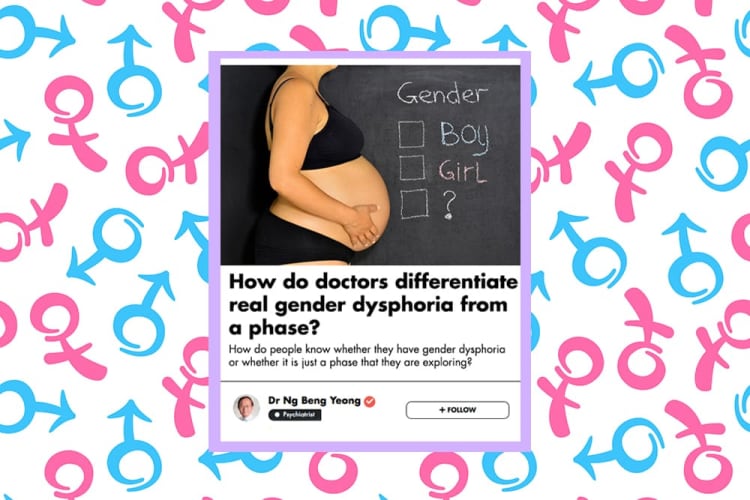In Singapore, some
- psychiatrists
- endocrinologists,
- psychologists
- and counsellors
are comfortable with treating persons with gender dysphoria. The best way is to call up the clinic and ask if the doctor or mental health professionals are comfortable with treating such individuals.
Gender dysphoria is the feeling of discomfort or distress that might occur in people whose gender identity differs from their sex assigned at birth or sex-related physical characteristics. That is, it involves a mismatch between a person's physical or assigned gender and the gender with which he/she/they identify.
People with gender dysphoria may be very uncomfortable with the gender they were assigned, sometimes described as being uncomfortable with their body (particularly developments during puberty) or being uncomfortable with the expected roles of their assigned gender.
Transgender and gender-nonconforming people might experience gender dysphoria at some point in their lives. But not everyone is affected. Some transgender and gender-nonconforming people feel at ease with their bodies, either with or without medical intervention.
The gender conflict affects people in different ways. It can change the way a person wants to express their gender and can influence behavior, dress and self-image. Some people may cross-dress, some may want to socially transition, others may want to medically transition with sex-change surgery and/or hormone treatment.
The Diagnostic and Statistical Manual of Mental Disorders (DSM-5) provides for one overarching diagnosis of gender dysphoria with separate specific criteria for children and for adolescents and adults.
In adolescents and adults gender dysphoria diagnosis involves a difference between one’s experienced/expressed gender and assigned gender, and significant distress or problems functioning.
It lasts at least six months and is shown by at least two of the following: [1]
- A marked incongruence between one’s experienced/expressed gender and primary and/or secondary sex characteristics.
- A strong desire to be rid of one’s primary and/or secondary sex characteristics.
- A strong desire for the primary and/or secondary sex characteristics of the other gender.
- A strong desire to be of the other gender.
- A strong desire to be treated as the other gender.
- A strong conviction that one has the typical feelings and reactions of the other gender.
In children, gender dysphoria diagnosis involves at least six of the following and an associated significant distress or impairment in function, lasting at least six months.
- A strong desire to be of the other gender or an insistence that one is the other gender.
- A strong preference for wearing clothes typical of the opposite gender.
- A strong preference for cross-gender roles in make-believe play or fantasy play.
- A strong preference for the toys, games or activities stereotypically used or engaged in by the other gender.
- A strong preference for playmates of the other gender.
- A strong rejection of toys, games and activities typical of one’s assigned gender.
- A strong dislike of one’s sexual anatomy.
- A strong desire for the physical sex characteristics that match one’s experienced gender.
For children, cross-gender behaviors may start between ages 2 and 4, the same age at which most typically developing children begin showing gendered behaviors and interests. Gender atypical behavior is common among young children and may be part of normal development.
Children who meet the criteria for gender dysphoria may or may not continue to experience it into adolescence and adulthood. Some research shows that children who had more intense symptoms and distress, who were more persistent, insistent and consistent in their cross-gender statements and behaviors, and who used more declarative statements (“I am a boy (or girl)” rather than “I want to be a boy (or girl)”) were more likely to become transgender adults. [2]
Treatment for gender dysphoria focuses on alleviating the patient’s distress surrounding their gender identity. That often means psychotherapy in which a psychiatrist, a psychologist or a counsellor validates their emotions and helps them develop effective coping skills, to deal with issues like self-injury and suicidality. If their distress has led to depression or anxiety, those may be treated with therapy or medication. Therapists also work with gender dysphoria patients, and their families, to help them determine the best way to shape their gender expression for the healthiest outcome.
Transgender and endocrinology organizations recommend waiting until at least 16 to start hormone treatment, but what is best for the individual needs to be considered. [3]
Pubertal blockers treatment to suppress puberty for as long as several years is sometimes used to give a patient time to decide whether to do surgery; since it stops the development of secondary sex characteristics. Pubertal blockers and hormones are prescribed by endocrinologists who are familiar with transgender hormone treatments. If a child has gender dysphoria and he or she has reached puberty, it is possible to use gonadotrophin-releasing hormone (GnRH) analogues. These are synthetic (man-made) hormones that suppress the hormones naturally produced by the body.
Some of the changes that take place during puberty are driven by hormones. For example, the hormone testosterone, which is produced by the testes in boys, helps stimulate penis growth. GnRH analogues suppress the hormones produced by the child’s body. They also suppress puberty and can help delay potentially distressing physical changes caused by their body becoming even more like that of their biological sex, until they are old enough to consider other treatment options.
Treatment options for gender dysphoria include:
- counseling
- cross-sex hormones
- puberty suppression
- and gender reassignment surgery
Some patients desire hormone therapy or sex reassignment surgery; others do not. Some adults may have a strong desire to be of a different gender and to be treated as a different gender without seeking medical treatment or altering their body. They may only want support to feel comfortable in their gender identity. Others may want more extensive treatment including hormone treatment and gender reassignment surgery leading to a transition to the opposite sex.
A child’s treatment typically involves a multi-disciplinary team of health care professionals, which may include:
- a pediatrician
- a psychiatrist
- other mental health professionals
- and a pediatric endocrinologist.
Treatment may focus primarily on affirming psychological support, understanding feelings and coping with distress, and giving children a safe space to articulate their feelings. It is important to realise that for many children the feelings do not continue into adolescence and adulthood.
References:
1. Ranna Parekh, M.D., M.P.H. What Is Gender Dysphoria? American Psychiatric Association. February 2016.
- Steensma TD, Mcguire JK, Kreukels BP, Beekman AJ, Cohen-kettenis PT. Factors associated with desistence and persistence of childhood gender dysphoria: a quantitative follow-up study. J Am Acad Child Adolesc Psychiatry. 2013;52(6):582-90.
3. Gender Dysphoria Basics. Child Mind Institute. Accessed 16 February 2020.



